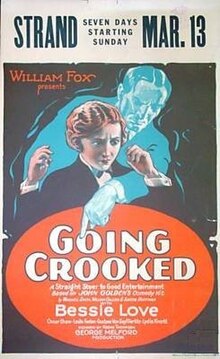Going Crooked
| Going Crooked | |
|---|---|
 Theater poster | |
| Directed by | George Melford |
| Written by | Albert S. Le Vino Keene Thompson William Counselman (intertitles)[1] |
| Based on | Going Crooked: a Comedy in Three Acts, from a Tale of Hoffman's (Aaron's) (play) by Winchell Smith William Collier Aaron Hoffman[2][3][4] |
| Produced by | William Fox[5] |
| Starring | Bessie Love |
| Cinematography | Charles G. Clarke[4][6] |
| Distributed by | Fox Film Corporation |
Release date |
|
Running time | 6 reels; 5,345 feet[4] |
| Country | United States |
| Language | Silent (English intertitles) |
Going Crooked is a 1926 American silent crime film[7] produced and distributed by the Fox Film Corporation. It was directed by George Melford and stars Bessie Love.
The film is preserved at the Museum of Modern Art, the George Eastman House, and the Bibliothèque nationale de France.[8][9]
Plot
Mordaunt (von Seyffertitz) and his gang use Marie (Love) as an unwitting accomplice in the theft of the acclaimed Rajah diamond. During the heist, a man is killed, and innocent Rogers (Fenton) is later sentenced to death for the murder.
Marie works with District Attorney Banning (Shaw) to get Mordaunt to confess, just in time to save Rogers from the electric chair. Marie and Shaw are married.[4][10][11]
Cast
- Bessie Love as Marie Farley
- Oscar Shaw as Banning
- Gustav von Seyffertitz as Mordaunt
- Edgar Kennedy (as Ed Kennedy) as Detective
- Leslie Fenton as Rogers
- Lydia Knott as Mother
- Bernard Siegel as Crook
- Evelyn Selbie
Production
For authenticity, some scenes were filmed on Ferguson Alley in Chinatown, Los Angeles.[12]
Reception
The film received positive reviews, with Love and von Seyffertitz receiving high acclaim for their performances.[1][11]
References
- ^ a b "George Melford Has a Good One". The Film Spectator. Vol. 2, no. 12. February 19, 1927. p. 5.
- ^ Goble, Alan, ed. (September 8, 2011). The Complete Index to Literary Sources in Film. Walter de Gruyter. p. 434. ISBN 978-3-11-095194-3.
- ^ Smith, Winchell; Collier, William; Hoffman, Aaron (1926). Going Crooked: a Comedy in Three Acts, from a Tale of Hoffman's (Aaron's). New York: Samuel French, Inc. OCLC 5906478.
- ^ a b c d Munden, Kenneth W., ed. (1971). The American Film Institute Catalog of Motion Pictures Produced in the United States: Feature Films 1921–1930. New York: R.R. Bowker Company. p. 300. ISBN 9780520215214. OCLC 664500075.
- ^ "Mystery, Melodrama and an Extra Measure of Laughs Make 'Going Crooked' a Straight Winner". Fox Folks. Vol. 5, no. 10. October 1926. p. 19.
- ^ Clarke, Charles G. (1989). Highlights and Shadows: The Memoirs of a Hollywood Cameraman. Scarecrow Press. ISBN 978-0-8108-2237-5.
- ^ "Going Crooked (1926)". American Film Institute.
- ^ "Going Crooked / George Melford [motion picture]". Library of Congress – Performing Arts Encyclopedia. Retrieved November 9, 2014.
- ^ "Going crooked (film)". BnF Catalogue général. Retrieved May 4, 2019.
- ^ "Going Crooked". The Film Daily. December 19, 1926. p. 10.
- ^ a b Sewell, C.S., ed. (December 18, 1926). "Through the Box-Office Window: Reviewers' Views on Feature Films". Moving Picture World. p. 525.
- ^ "Chinese Complications". Motion Picture News. October 2, 1926. p. 1256.
